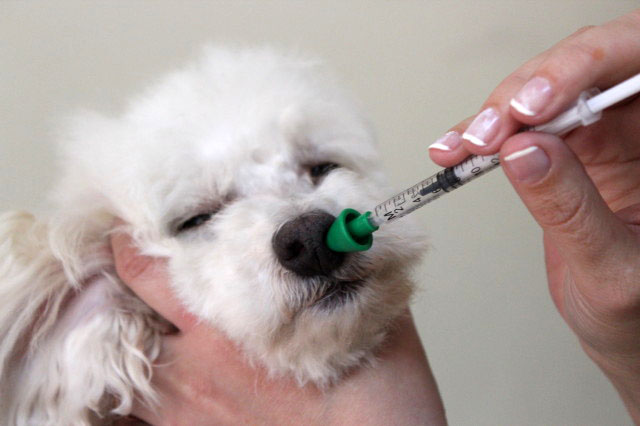Kennel cough is the common name for canine infectious tracheobronchitis, a highly contagious respiratory infection in dogs.
It can be caused by a number of bacteria and viruses, but the symptoms and treatments are the same in the vast majority of cases.
All of the viruses and bacteria that can cause kennel cough are airborne and highly infectious, and can be spread by being close to infected dogs, or sharing items such as toys or bowls.
Kennel cough symptoms
- Persistent dry cough
- Retching, as though they’re trying to clear their throat of an obstruction
- Watery nasal discharge
In mild cases there may be no symptoms, and your dog will continue to eat normally. In severe cases dogs can become lethargic, lose their appetite, develop a fever or pneumonia, and in some cases it can be fatal.
If you suspect your dog has kennel cough, it’s best to get a diagnosis from your vet.
How to prevent kennel cough
The best way to limit the chance of your dog catching kennel cough is simple: don’t expose them (especially when they’re a puppy) to infected dogs. Trickier than you might think, if you need to exercise your pooch in the local dog park.
There is a vaccination available, which is given by a squirt up the nose which places the immunity right where it is needed. (Hurrah, not an injection!). Your dog will need one every 12 months.
Although the vaccination does a great job of reducing the risk of infection, it doesn’t completely prevent your dog picking up kennel cough as there are so many different pathogens that can cause it. If your dog has been vaccinated, and they still manage to get kennel cough, the symptoms will be much milder, and recovery time shorter.
In puppies, older dogs or pregnant pooches, kennel cough can cause serious problems as their immune systems are weaker. Vaccines in these cases are very important.

Treatment of kennel cough:
Treatment for kennel cough should always be prescribed by a vet. You should tell them if your pooch has come into contact with a sick dog or if they have recently been in a kennel, or another place with lots of other doggos around.
Once a treatment plan has been prescribed, your dog should be back to health in no more than 3 weeks.
Can humans catch kennel cough?
Healthy adults are highly unlikely to catch the infection, but young children and immunodeficient individuals might be at risk.
Humans can’t be vaccinated against it, so infants, the elderly and the unwell should avoid contact with dogs with symptoms of kennel cough.
Kennels and kennel cough:
Kennels = lots of dogs in close proximity.
Some of those dogs might have been vaccinated, some of them won’t have been, and the chances are high that at any time, at least one dog in their care will have kennel cough.
This perfect storm makes it really hard for kennels to avoid the spread of infection.
Strict hygiene is required – regular cleaning and disinfection of cages and bowls, and a consistent supply of clean and fresh water.
What’s more, indoor cages need to be well ventilated, and staff should wear gloves and wash their hands regularly.
You could avoid the kennel route and try Gudog next time you go on holiday (just sayin’). We’ve got trusted dog sitters all over the UK who can give one-on-one care to your pooch in a home environment, meaning that your doggo will not only be far less likely to catch any nasties, they’ll also get the pampering they deserve while you’re away!
What is Gudog?
Gudog is the easiest way to find & book the perfect dog Sitter. Thousands of loving Sitters are ready to care for your dog like family! All bookings come with Veterinary Care & Free Cancellation.
